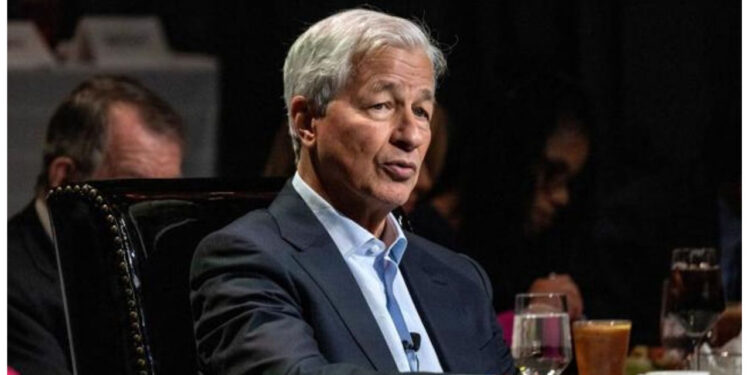According to Jamie Dimon, the chairman and CEO of JPMorgan Chase, the current state of the economy is increasingly reminiscent of the 1970s.
Jamie Dimon, the CEO of America’s largest bank, has been cautious about the state of the economy. In a recent interview with CNBC’s “Fast Money Halftime Report,” he expressed that although the economy is currently doing well, markets have a tendency to change rapidly. Dimon reminded viewers that in 1972, people were optimistic before experiencing a crash, emphasizing the importance of remaining vigilant in a dynamic market environment.
The CEO, who earned a staggering $36 million for his efforts in 2023, also suggested that certain aspects may be in a more precarious state in 2024 compared to 1970. He elaborated, “Looking back to the 70s, deficits were only half of what they are today, and the debt to GDP ratio stood at 35%, not the current 100%. Consequently, I believe a contributing factor to our robust growth has been the increased government spending.”
“Why not consider investing an additional $2 trillion? Imagine the possibilities that could arise from such an investment – increased wealth, greater investments, more job opportunities, and ultimately, amplified economic growth.”
Jamie Dimon has previously referred to the national debt problem in the United States as a “cliff,” expressing his concern by stating, “If you look at that 100% debt to GDP by [2035], I think it’s going to be 130%, and it’s a hockey stick. That hockey stick doesn’t start yet, but when it does, markets around the world…there will be a rebellion.”
This week, Dimon once again expressed his concerns about the potential drawbacks of continued massive fiscal spending. During a New York session hosted by Marie-Josée Kravis, the chair of the Museum of Modern Art, he emphasized the inflationary risks associated with such spending. Dimon acknowledged that while the current situation seems to be heading towards a soft landing, he remains cautious about the trade-offs involved.
During my analysis, I’ve noticed that Dimon isn’t the sole individual who finds similarities between our current era and the 1970s. In fact, Deutsche Bank published a note in October of last year, highlighting the “striking number of parallels” between these two decades.
According to veteran strategist Henry Allen, there have been many promising indications that we can avoid a return to the 1970s. However, given the ongoing conflict in the Middle East, it is still too early to declare complete safety.
‘Unbelievable’ economy
Jamie Dimon, known for his proactive approach in preparing JPMorgan for various economic scenarios, expressed unease about the potential resurgence of a 1970s-like era. However, his overall perspective remains optimistic.
Jamie Dimon, the CEO of JPMorgan Chase, expressed his astonishment at the remarkable resilience of the market. In his own words, he described it as “unbelievable” and emphasized how it has been booming for quite some time now.
According to the speaker, “Unemployment has reached a record low, and it has remained below 4% for the majority of the past two or three years. Additionally, the American consumer, despite the possibility of a recession, is in a much better financial position. Their home prices have increased, and their stock prices have also seen a rise.”
House prices in the United States have been steadily increasing since 2020, even before the significant impact of the pandemic. According to the St Louis Fed, the average house price was $374,500 four years ago and has now surged to $492,300.
Six out of 10 households who already own their property are benefiting from this, although it may be discouraging for potential buyers looking to enter the market.
The S&P500 has shown strong performance, with a year-to-date increase of approximately 7% and a remarkable 22.5% growth over the past 12 months.
Dimon confidently stated, “The consumer is in good shape, even if we go into a recession.”










